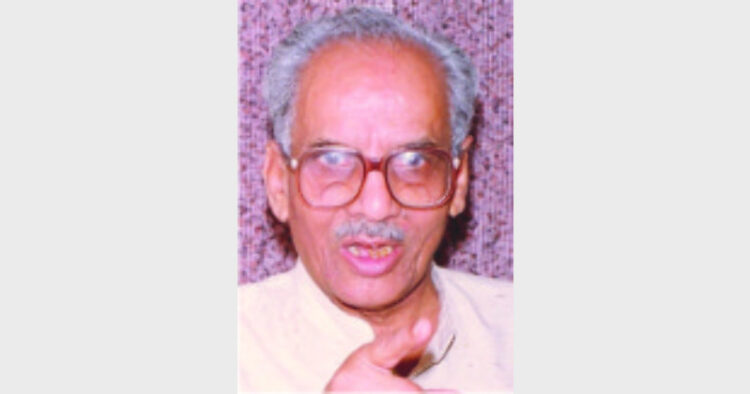Weekly lecture by Devendra Swarup on Constitutional Framework & Structures of Governance
“The British could not have stayed in India indefinitely. But their high statesmen wanted to ensure that when the time for the departure came, they should leave behind a grateful and not a hostile nation. If they were to create a small class of Indians trained and educated in the British system, then it would be possible to ultimately transfer power to this class. That, they foresaw as their final victory. In this plan, the British succeeded, perhaps much beyond their expectations and hopes,” said noted historian Shri Devendra Swarup while delivering the sixth lecture in the series that he has been delivering since June 30 on Constitutional Framework & Structures of Governance in India: A Historical Perspective. The weekly lecture series has been organised by Centre for Policy Studies, New Delhi. Many intellectuals including Shri Rambahadur Rai, Shri Suryakant Bali, Prof Rajkumar Bhatia, Dr JK Bajaj, Shri Banwari, Smt Meenakshi Jain, etc were also present on the occasion.
In his talks Shri Swarup continued his exposition of the eighteenth and early nineteenth century history of India. He had ended his previous talk on a major turning point of Indian history–the year 1803. That date has not been accorded its due place in our history texts which present 1818, the year in which the Peshwaship was abolished, as the decisive point. But 1818 was a mere formalisation of a momentous shift in power that happened in 1803, when the British entered Delhi and ousted the Marathas. This event established that the future belonged to the British, and not the Marathas.
He said the Muslim Ulema immediately understood the significance of this event. Shah Abdul Aziz issued a fatwa declaring the British to be the principal enemy and declaring that in that difficult situation it was permissible to ally with kafirs, meaning the Marathas in this case, to defeat the British. This was a complete reversal of the Muslim position till then. A few decades earlier, Abdul Aziz’s father Shah Waliullah, alarmed at the rise of Sikh and Maratha power, had invited the Afghan ruler Ahmad Shah Abdali to invade India in support of Muslim supremacy. That invasion had resulted in the rout of the Marathas in the third battle of Panipat in 1761.
Shri Swarup said it was after 1803 that Pindaris become important in Indian history. They were associated with various Maratha camps. There were large groups of Pindaris with the Holkars and Sindhias and they were accordingly known as the Holkarshahi and Sindhiashahi Pindaris. They used to launch destructive forays into British territory and then return to the Maratha regions. The British came to look upon them as a major disruptive force aligned against them. With the British thus becoming the predominant power in India, they began to consciously replace their earlier admiration for Indian civilisation with a conviction in British superiority.
He said in the wake of the industrial revolution and technological breakthroughs, the British were experimenting with new institutions; some of the latter they also introduced in India. Several Governor-Generals were of the view that technological change in India would help establish British ideas, institutions and administration in India.
In the seventh talk delivered on August 11 Shri Devendra Swarup dealt with the period between 1803, when the British reached Delhi, and 1857. He said it is important to study this period, if we have to form a proper comprehension of the roots of our current governing structures and constitutional framework. It was in this period that the British began to evolve and implement the administrative arrangements, judicial structures and various codes and procedures of executive and judicial administration that are still with us today.
One of the important concerns of the British in this period was to find ways of Christianising India. They felt that Christianisation of their subjects would help strengthen the bonds between the rulers and the ruled. That is why, while renewing the Charter in 1813, missionaries were for the first time formally permitted to enter Company territory. We do not know what would have happened if the struggle of 1857 had succeeded. But it can be certainly said that if 1857 had not occurred, the whole of Indian army would have been Christianised, and it would have probably opened the floodgates for the Christianisation of the rest of Indian society. We have to be thankful to Savarkar for bringing the real face of 1857 before the nation.
In the eight lecture delivered on August 18, Shri Devendra Swarup focused on different aspects of the 1857 revolution. Mentioning about the coverage of the revolution in foreign media Shri Swarup stressed the need to study the revolution in different perspectives and not to stick only to the self-praise. He said the literature generated on this issue so far has more self-praise than the introspection.
(FOC)














Comments